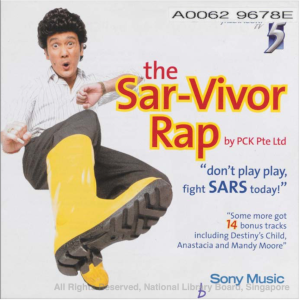Singapore Pharmakon
August 21, 2022

On 22 August 1999, then Prime Minister Goh Chok Tong during a National Day Rally address, described the ‘heartlander’ Singaporean who speaks Singapore English, the colloquial form of English spoken in Singapore commonly referred to as ‘Singlish’, as lagging behind his or her ‘cosmopolitan’ compatriot. This was similarly argued by then Senior Minister Lee Kuan Yew, who stated “We are learning English so that we can understand the world and the world can understand us… Do not popularise Singlish. […] Singlish is a handicap we must not wish on Singaporeans”.
In ‘Singapore Pharmakon’ (Social Identities: Journal for the Study of Race, Nation and Culture, 2007) Associate Professor Irving Goh (NUS Department of English Language and Literature) and Associate Professor Tan Ying-Ying (NTU Division of Linguistics and Multilingual Studies) write about the role of Singlish and dialects during the outbreak of Severe Acute Respiratory Syndrome (SARS) in 2003, and how they may be described to be pharmakon, meaning both ‘cure’ and ‘poison’, to Singaporean society.
English was first made an official language in Singapore in 1965, based on the ideologies of ‘pragmatism’ and ‘neutrality’. With English not being an Asian language or mother tongue of any of the ethnic groups in Singapore, English was institutionalised as a compulsory language in schools, and served as the de facto national language in Singapore.
Singlish is the language that Singaporeans speak more than any other tongue. Singlish is unique in how it may in some ways be intelligible to any English language speaker, yet sound like a different language altogether. According to A/P Goh and A/P Tan, the Singapore English accent will always inflect Singaporeans’ speech, even if all non-English elements within Singapore English are erased. Although there is no one exact form of Singlish, it fosters a community among Singaporeans, where this creole language binds them together.
Despite this, Singlish is frequently argued by policymakers to have no place in Singapore because with its differences from standard English, it is viewed to hinder Singapore from being part of the global trade community. As asserted by then Prime Minister Goh Chok Tong, “Singlish is not English. It is English corrupted by Singaporeans”. They see it as imperative to resurrect the ‘original’ British English that was institutionalised by the Government of Singapore.
Nevertheless, during the outbreak of SARS, the government eventually turned to Singlish to communicate to Singaporeans through ‘Sar-Vivor’, a music video featuring television figure Phua Chu Kang. Phua, who speaks only in Singlish, became the iconic dispenser of information during the SARS epidemic. This was notable as the video was sponsored by two governmental arms of the State, the Ministry of Health and the Health Promotion Board. Before SARS, then Prime Minister Goh Chong Tong had considered Phua to be a bad influence to the people; yet the production of ‘Sar-vivor’ indicated the implicit acknowledgement by the government that Singlish remains the language that speaks to a critical mass.
Read the article here.
